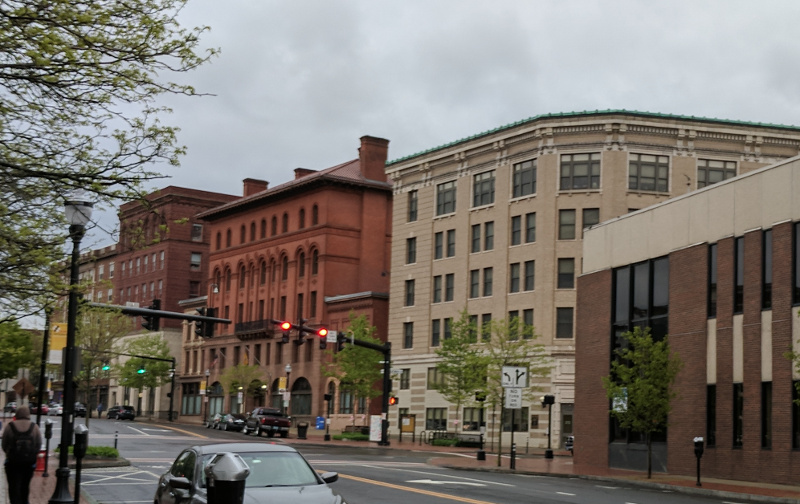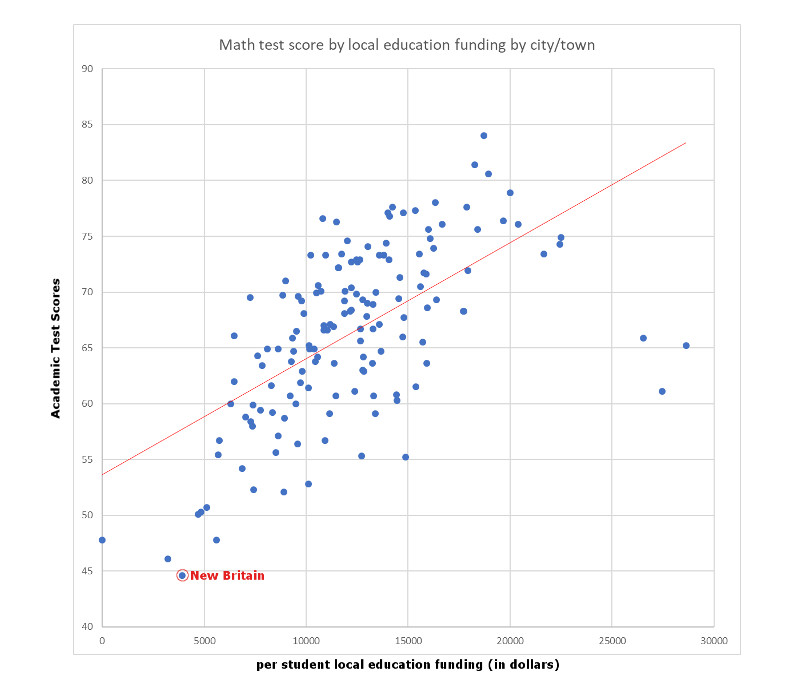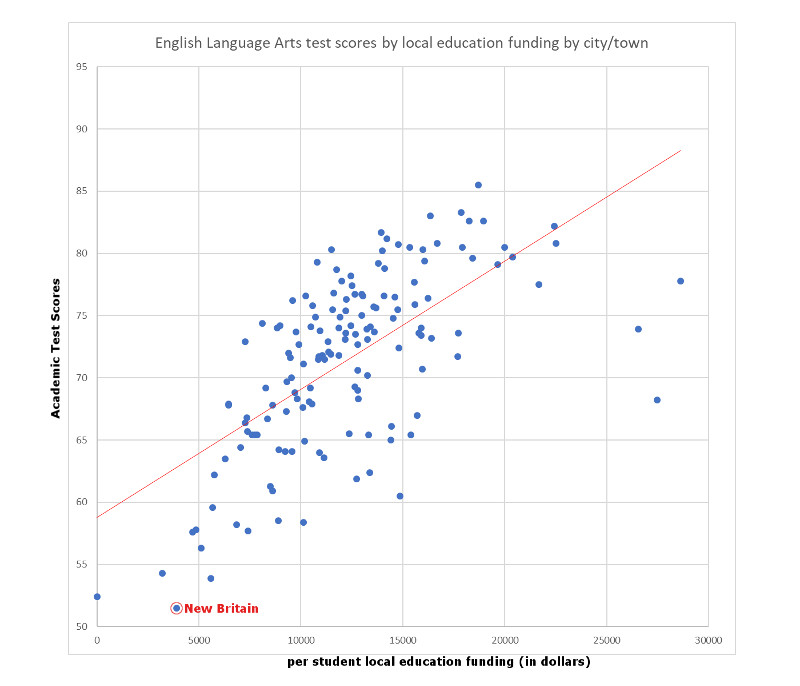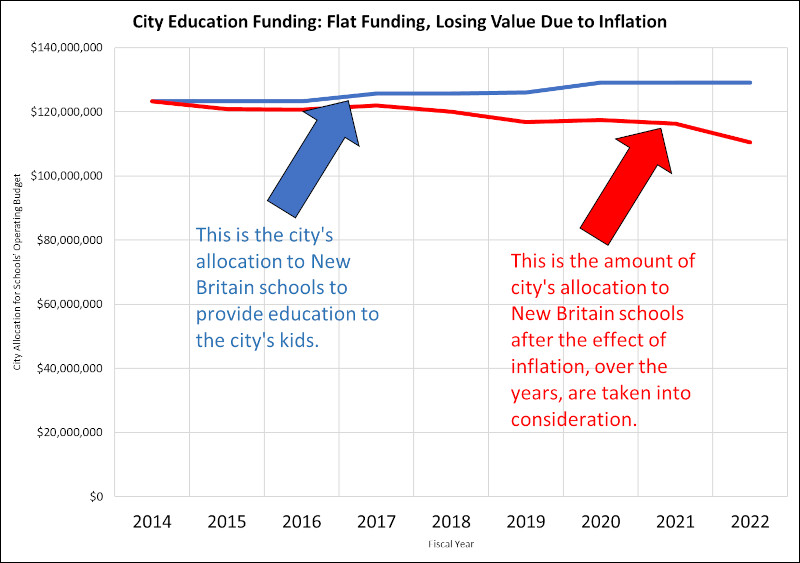Republican Mayor Erin Stewart has developed a reputation of antagonism toward both school funding and those who run the city’s schools.
Stewart’s critics point out that she has routinely frozen local annual operating funding for the city’s schools while also claiming credit for funding provided by the state as if were her own commitment to education.
Critics also say Stewart has had a pattern of abrasive interactions with the New Britain school system, not just Democrats on Board of Education, but also the professional administrators and even school board members of her own party. She even went so far as to squeeze a longtime Republican Party regular from the school board who it is said did not tow the Stewart-Republican line enough — casting more than a passing resemblance to Trumpism in the national Republican Party.
Few doubt that the enormity of Stewart’s win in the 2021 city elections, including Republican gain on the Board of Education, would evoke a certain triumphalism and conceit from Stewart and her machine, including toward the school system. In the 2021 budget process, Stewart evoked a familiar conservative playbook, “can’t throw money at the problem,” trope to defend her dearth of local commitment to our city’s schools, a trope that inevitably includes blaming educators for the results of low school funding. After the election, Stewart then minaciously intimated that she would press her new power within that scheme.
But, for a politician whose critics have questioned whether she even considers quality education to be a part of her job as mayor, Stewart seems to have a surprisingly keen interest in how the decisions are made by school system, and by whom — so much so that it leaves a pointedly curious question as to why.
As in every year, there was so much news that the New Britain Progressive covered 2021 that choosing our traditional Top Ten stories of the year is difficult. But the dire state of the politics of education in New Britain makes this story #3 of the New Britain Progressive‘s Top Ten Stories of 2021.

Stewart Seeks To Exclude BOE, Common Council From Approving Use Of School Construction Money
March 8, 2021
By John McNamara
The Stewart Administration, blocked in recent months by a bipartisan Board of Education (BOE) and city ordinance from filling a political patronage job on a new school construction project, will seek to remove Common Council and BOE authority on school construction spending handing the final say over to the seven-member School Building Committee (SBC) appointed by the Mayor.

A resolution filed by the Republican caucus Majority Leader Daniel Salerno and Alderwoman Sharon Beloin-Saavedra at the March 10th Council meeting would alter the membership of the SBC, by dropping Common Council appointments. It would further cede approval to “engage, select, and enter into or continue all necessary contracts with contractors, architects, landscape architects, or engineers, and within the limits of the appropriations made by the council, this committee shall engage and fix the salary of one or more construction representatives ” to the School Building Committee. The existing ordinance requires approval by the BOE and Common Council.
The hiring of a construction representative for the Chamberlain Elementary School renovation project and re-roofing projects at Pulaski and Slade Middle Schools sparked controversy last year when the SBC selected Ray Moore, the former Schools’ facilities director, to be a construction representative at a six-figure salary shortly after he retired from his job at the schools. Former NBHS Principal and retired School Administrator Paul Salina, who is the Stewart appointed Director of Support Services at City Hall, reportedly pushed hard for Moore, his former colleague, to get the lucrative construction representative’s position.
BOE members, however, objected to the Moore hiring saying a newly-hired Facilities Director in the School District could handle oversight of the Chamberlain renovation without the added costs. “We try to save as much as city-wide taxpayer money as possible.” BOE Member Violette Jimenez Sims told the New Britain Herald’s Catherine Shen in a November 24th story. “For me, I would rather spend the money that would directly impact the children that they can use forever and ever and not spending it on a redundant service.”
The Moore hire was subsequently set aside after BOE Attorney Patrick McHale asserted that state statutes and the ordinance gave the BOE the right of approval of the construction manager who answers to the SBC.
For all its clout in allocating and contracting tens of millions of dollars for school construction the School Building Committee is a relatively obscure municipal government committee. It’s not easily found on the city website’s link to boards and commissions. Its Chairperson, Frances Wolski, has been a member for multiple two-year terms during the Stewart administrations. The committee has seven members but two seats are vacant as of February. The Committee’s most prominent member in recent years has been former Mayor Timothy Stewart, a position of influence he held during his daughter’s first two terms until his mysogynistic social media rants ended his tenure on the committee and as head of the Chamber of Commerce.
Last year the Council approved $57 million for the Chamberlain renovation and re-roofing projects contingent on state reimbursements. State Representative Bobby Sanchez (D-25), the Chair of the Legislature’s Education Committee, has successfully worked to get a 95% reimbursement from the state for a renovated Chamberlain School in the east end and roof upgrades to two middle schools.
The proposed School Building Committee resolution is certain to raise new concerns by Common Council Democrats over the propriety of removing Council and BOE checks and balances on school construction. School construction projects involve millions of dollars in state bond and local funds that need to be allocated with competitive bidding and full transparency, which is what the existing ordinance ensures. Ceding all power now to the Mayor’s office and the Mayoral appointed SBC creates a process that will eliminate oversight by elected BOE and Council members.
Related Story: School Building Committee Pick For Architect of Smalley Academy Renovation Has Its Share of Troubles.
Related Story from New Britain Herald: Construction Bill Will Fund Three New Britain School Projects.
Sanchez Blasts Stewart Over Education Comments and Underfunding
March 12, 2021
Rep. Bobby Sanchez (D-25) blasted Republican Mayor Erin Stewart over comments in which she doubled-down on her underfunding of the city’s schools.

In her annual state of the city address to the City Council, Stewart bluntly said that her longstanding policy of low-funding to New Britain’s schools will continue in the city budget for the next year.
Stewart curtly said that, “what I will not do is blindly throw additional tax dollars into a massive bureaucracy that is failing our students.”
“To be honest,” Rep. Sanchez said, “I wish I was more surprised by the mayor’s decision to continue to underfund education and blame others for their struggles.”
Sanchez’ press release noted that, “She recently made statements that blamed the school system itself, removing any responsibility from her administration, which has refused to increase funding in recent years.”

“Similar to blaming the Governor’s office for New Britain having one of the worst COVID responses in the state,” Rep. Sanchez said, “this new attack on the hardworking educators in our schools is part of a larger disturbing trend where if you’re looking for someone to take responsibility, you’re not going to find them at City Hall.”
Earlier this year, Rep. Sanchez opened an exploratory committee to consider running for Mayor.
“This type of leadership is unacceptable, especially in the midst of a pandemic,” Sanchez added.
Stewart has been criticized for repeatedly flat-funding the city’s funding for the operating budget of New Britain schools.
Stewart essentially admitted, in her comments, that she has flat-funded the city’s schools, saying, “Every year, the Consolidated School District of New Britain receives about $126 million of taxpayer money, and today, it is dead last, when every metric within the state of Connecticut education performance index.”
But critics have pointed to Stewart’s flat-funding of schools as an important reason for those low academic scores.
The New Britain Progressive reported in 2019 that, despite New Britain receiving, “the fifth highest state Education Cost Sharing grant funding of all of the cities and towns in the state,”
New Britain’s own local commitment to education, on the other hand, is among the lowest municipal school districts in the state. Only Bridgeport allocated less local funding per student than New Britain in the 2015-2016 state data.
While New Britain residents have less money than the state average to fund local services, the New Britain Progressive reported that, even looking at a percent of the city’s ability to pay, the city of New Britain still appeared to allocate to its schools, “the second lowest among municipal school districts in the state.”
Hartford’s contribution was not in that data and may have been lower, still, which would have made New Britain third lowest.
“During Mayor Stewart‘s term,” Rep. Sanchez said. “New Britain has gone from middle of the pack to dead last in achievement and funding.”
The New Britain Progressive also reported in 2019 that,
Comparing the amount of local support for education, using the 2015-2016 data, to the most recent academic test scores appears to show a general correlation between how much a city or town provides in local funding for their schools and the test scores of the students in their schools. The comparison appears to show New Britain’s place near the bottom of both local education funding and test scores as part of a larger pattern, with New Britain near the low end of the scale.


In 2019, the New Britain Progressive reported that, at that time, it appeared that it would have taken a $14 million or more per year local education funding increase from the city to get the city up to the average amount cities and towns spent as a portion of their local ability to pay, apparently leaving New Britain’s city commitment to annual school operating budgets far behind the benchmarks that appear correlated with higher educational outcomes.
“As Chair of the Education Committee in our State Legislature,” Rep. Sanchez said, “I have worked tirelessly alongside the other members of our delegation to deliver as much money and resources as possible to our city.”
The current two year state budget increases state Educational Cost Sharing Grant funding for New Britain schools by $8,146,298, according to the nonpartisan legislative Office of Fiscal Analysis. Senator Rick Lopes (D-6), then a state representative, and Rep. Peter Tercyak (D-26) joined Rep. Bobby Sanchez in voting to approve that budget. Rep. Manny Sanchez (D-24) was elected to the state legislature later that year.
“We have delivered millions back to our city but without partners on the city level that care about education our schools will continue to be underfunded,” Rep. Bobby Sanchez said.
“What is most tragic in these discussions,” said Rep. Sanchez, “is that we lose track of the kids. When adults who are in positions to improve their lives are simply pointing fingers they lose. As a former teacher this truly saddens me because our kids have enough to deal with here in New Britain.”
“During this time,” Sanchez said pointedly, “we need leaders who are ready to step up and find solutions, not blame others.”
School Building Committee Resolution Curtails Checks and Balances On Construction Projects
April 30, 2021
“A consequence of the new SBC resolution is that it contributes to a bigger divide between City Hall and the BOE. New Britain’s close to last ranking in how much the municipal government contributes to public schools is a perennial and contentious issue at budget time every year and this year is no exception.”
By John McNamara
A controversial resolution that removes Common Council and Board of Education approval of all contracts and spending on school construction projects came back to the Common Council April 28th meeting and was approved on a party line vote.
The resolution, authored by Republican caucus members Daniel Salerno and Sharon Beloin-Saavedra and revised at the April 15th Consolidation Committee meeting, removes key language that requires that contracts and expenditures on multi-million dollar school projects are “subject to the approval of the board of education and common council.” Instead, it vests control of School Building Committee (SBC) appointments to the Mayor, leaving the Council with two members on the seven-member committee.
According to the new resolution the SBC will “engage, select, and enter into or continue all necessary contracts with contractors, architects, landscape architects, or engineers, and within the limits of the appropriations made by the council, this committee shall engage and fix the salary of one or more construction representatives.”
Salerno and Beloin-Saavedra, acting on behalf of Mayor Erin Stewart and willingly diminishing the Common Council’s role, cite mayoral powers in the City Charter granting appointment power for all “boards and commissions” to the Mayor as a justification for the sweeping changes that hand the purse strings and contracting over to the SBC for school renovations and construction. They say they are just cleaning up the language in accordance with the charter.
As if trying to obscure the intent of the resolution, the revised ordinance has a preamble that implies Common Council members would continue to have a say in SBC meetings and deliberations or, for that matter, any other board or commission using general ordinance language on the access any common council member has to go to a public meeting: “Alderpersons may attend any meetings. The members of the council, or any of them, may attend the regular, special, or other meetings of all boards, commissions, and agencies when, in their discretion, their presence would best serve the interests of the city.”
Unlike boards and commissions mandated by the City Charter, however, the School Building Committee is created by ordinance with purposes and conditions set by the Common Council in accordance with powers granted to the legislative branch (the Council). The mayoral powers justification for ending all BOE and Council oversight on school building projects is both exclusionary and unwise given the large amounts of taxpayer money involved on these projects which are heavily reimbursed by the state and its bonding authority. Most recently makeovers of the Smalley and Gaffney schools have cost upwards of $80 million.
Although the lion’s share of funding for any school construction comes from the state, Connecticut law is silent on local school building committees, their powers and composition, according to a legislative analysis on SBCs and school construction. What the analysis does say, however, is that boards of education are ultimately responsible and must “make a continuing study of the need for school facilities and of a long-term school building program.” State statutes do no specify how local school boards must carry out their responsibility for maintaining school buildings. Nothing either requires or allows a board to, or prevents it from, establishing a permanent committee to oversee school maintenance.”
The revised New Britain resolution makes the Superintendent of Schools an ex-officio member of the SBC which is to say the BOE’s representative is an observer without a vote.
Democratic Alderman at Large Chris Anderson opposed the revised ordinance asserting that it “consolidates power, reduces transparency and eliminates checks and balances.” He was joined by five other Democrats on the Council opposing the move to usurp Common Council and Board of Education authority over public monies they appropriate and are responsible for in the school district’s buildings.
A consequence of the new SBC resolution is that it contributes to a bigger divide between City Hall and the BOE. New Britain’s close to last ranking in how much the municipal government contributes to public schools is a perennial and contentious issue at budget time every year and this year is no exception. Politically, it serves the Mayor and her Council cohorts well to disparage the BOE by implying it wastes money as they engage in tax-cut demagoguery. During the Common Council’s discussion of the SBC resolution, for example, Alderwomen Beloin-Saavedra, a former BOE President, didn’t help BOE-City Hall cooperation in her defense of the amended resolution. She disparagingly pointed to the BOE and school administration as the place where more oversight is needed,asking “who’s watching the henhouse over there?”
And as with most issues to come before the Council the nine members of the Republican caucus (they dare not call themselves Republican and go by the name of the RUD caucus) remained rubber stamps for Mayor Stewart, ceding absolute control over the school construction process and the opportunities it presents the city administration for patronage, favors and picking contractors.
Posted from https://nbpoliticus.com/
The Return of Tim Stewart: Ex-Mayor Chairs SBC As $50M School Project Begins
August 22, 2021
By John McNamara
Former Mayor Tim Stewart is the new Chairperson of the School Building Committee, gaining reappointment by his daughter, Mayor Erin Stewart, just as the seven-member committee moves forward with expenditures on the $50 million major renovation at the Chamberlain Elementary School on the city’s East Side.
The former four-term Mayor resigned from the SBC and the Mattabassett District Commission in 2019 under pressure and at the behest of his daughter, over offensive, misogynestic social media posts that referred to Democratic U.S. representatives in Congress, including 5th District Rep. Jahana Hayes, as “bitches in heat.” The controversy also forced Stewart out of his job as President of the New Britain Chamber of Commerce. Stewart currently works as a commercial realtor. In 2017 Stewart came under fire for disparaging and racially charged remarks about the North Oak neighborhood, but he held on to his municipal appointments and Chamber job.

His return to the SBC comes after the Common Council on April 28th approved by a party-line vote a resolution to increase the powers of the SBC, designate the Mayor as the sole appointing authority and to diminish oversight by the Common Council and Board of Education.
The city is receiving a higher than usual 95 percent reimbursement for the Chamberlain school project for which a groundbreaking occurred August 10th. Representatives of Kaestle Boos Associates and Newfield Construction, the major contractors on the two-year project, were joined by Stewart administration officials. State Representative Bobby Sanchez (D-25), the House Chair of the Legislature’s Education Committee, led efforts to secure the state bonding for Chamberlain and previously worked to secure state financing of Smalley and Gaffney school projects. Neither Sanchez, who is seeking the Democratic nomination for Mayor in the September 14th Primary to run against Stewart, nor BOE members were reported as participants at the groundbreaking.
The revised ordinance , authored by Republican Caucus members Danny Salerno and Sharon Beloin-Saavadra, has drawn bipartisan protests. It gives the SBC absolute authority to “engage, select, and enter into or continue all necessary contracts with contractors, architects, landscape architects, or engineers.” Those powers also extend to hiring “construction representatives” on projects, positions that have been known to turn into lucrative patronage jobs. The ordinance retains board of education and common council approval of preliminary and final plans but everything in between, including change orders and expenditures in design/build and construction phases, is left up to the SBC.
News of Stewart’s low-key return to the SBC appeared on the August 18th agenda of the SBC in a terse statement: “Chairperson Fran Wolski stepped down and Tim Stewart is the new elected Chairman.” Last February SBC Chair Wolski announced her resignation as the Chair, according to the SBC committee minutes. According to the city’s website, Wolski remains a member with Stewart as Chair and Peter Smulski as Vice Chair. Other members include Robert Ames, Michael Cassella and Angelo D’Alfonso. Paul Salina, the Stewart-appointed Director of Support Services and a former school administrator, oversees the SBC for the city.
In his prior time on the SBC in 2016 Stewart with Wolski supported the selection of a troubled Bridgeport architectural firm with a less than stellar, litigious track record for the $53 million Smalley School project, a decision that was subsequently set aside when New Britain-based Kaestle Boos Associates challenged the selection process. State Senator Rick Lopes (D-6), then the 24th District State Representative, alerted the SBC to the problem but the committee chose the “beleaguered” Bridgeport firm anyway. That action resulted in delays and cost overruns on the Smalley project.
Relations between the Mayor’s office and the BOE, contentious over budget issues in most years, have become even more adversarial over the SBC’s move late last year to hire Ray Moore, a retired school facilities director and a colleague of Paul Salina, as a consultant or “construction representative” on the Chamberlain School project at a six-figure annualized salary. BOE President Merrill Gay, Vice Chair Nick Mercier and Dr. Violette Jimenez-Sims criticized the attempted hiring with “no request for proposals or bidding for this position,” asserting that the role could be filled with existing school staff to save money for other education needs. Intervention by the BOE’s attorney averted a full appointment of Moore at that time to the consultant post. Republican Mercier’s public opposition to hiring a consultant without BOE input and questioning the Stewart-controlled SBC also led to the Republican Town Committee’s ousting of Mercier in July for a nomination to a third term on the BOE. A longtime Republican activist and music teacher, Mercier will stand for re-election to the BOE as a petitioning candidate for his efforts at accountability on school construction issues.
By bringing back her father to now lead the SBC as another major school construction project starts, Mayor Stewart is doubling down on an adversarial relationship with the Board of Education and school officials which unfortunately is a centerpiece of her campaign for re-election.
At the same time the new School Building Committee ordinance provides fewer checks and balances by the Council and BOE in the spending of public dollars . That means public scrutiny and closer monitoring of the SBC (Monthly meetings occur the third Wednesday of the month at noon) is needed now more than it has ever been as the Chamberlain School project moves forward.
from: http://nbpoliticus.com
Behind Mayor Stewart’s War On Supt. Sarra and the BOE
October 26, 2021
By John McNamara
The vandalism and trouble that occurred at New Britain High School in September needlessly escalated the rift between Mayor Erin Stewart and New Britain School District leaders.
Incidents of student misbehavior fueled by social media have not been limited to New Britain as districts in CT and elsewhere re-opened this fall.
Mayor Erin Stewart, however, used the disruption to immediately berate School Superintendent Nancy Sarra and educators for not cracking down enough on youthful offenders. The call to meet and work together came second only after Erin Stewart got her licks in on the campaign trail. Harsh criticism of educators is a central theme of Ms. Stewart’s re-election campaign. The NBHS incident was just an opening for the incumbent mayor to score political points at the expense of school officials dealing with Tik Tok-related misbehavior and parents wanting assurances that their children would be OK.
The Mayor’s social media response to the high school incident could be forgiven if it was a one off dispute between City Hall and the School District. The dialogue gets predictably contentious every year over local funding for schools as New Britain has ranked near the bottom on school spending during the Stewart years.
Mayor Stewart maintains that the schools need to “operate differently” before she’ll support additional city dollars for education. When Council Democrats proposed a meager $1 million increase in this year’s municipal budget Stewart and her Council Caucus opposed it. A $500,000 boost was OK’d but the City is holding onto that money four months into the fiscal year claiming that it has increased local aid to education without giving up a dime.
Stewart skewers the school district for being “dead last” in student achievement while her budgets give New Britain almost dead last ranking in how they support public education. Previously, the Mayor has expressed little concern or no concern over school achievement as she denies BOE requests each year. “In recent years, educators have said they need at least $5 million more than their regular budgets to catch up with similar districts. The nonpartisan School and State Finance Project last year reported that only Danbury spends less on each student than New Britain does, with even deeply impoverished systems like Bridgeport, Waterbury and Windham spending more,” according to a story by The Hartford Courant’s Don Stacom.
In her escalating feud with Sarra and the bipartisan Board of Education, Stewart employs Paul Salina, who has held a $90,000+ patronage job (interim director of operations) at City Hall since 2018. A former NBHS Principal and band leader who retired in 2003, Salina, 72, later returned to the public schools as an administrator before and after Kelt Cooper’s superintendency holding down a $146,000 operations officer job. When Superintendent Sarra reorganized and reduced administrative overhead, she reduced Salina’s role and salary. Salina retired again but quickly joined the Stewart administration with a vague and largely undefined strategy and policy role.
Within the last year the Stewart-Salina duo has ramped up the fight with the BOE on a range of issues from the hiring of a football coach to school funding to control of school construction leaving no space for any kind of cooperation.

The fight over the last year has primarily involved the School Building Committee (SBC) and the attempted hiring of another retired school official and colleague of Salina for an oversight job on the Chamberlain School renovation project.
‘The Return of Tim Stewart: Ex-Mayor Chairs SBC As $50M School Project Begins”
“Relations between the Mayor’s office and the BOE, contentious over budget issues in most years, have become even more adversarial over the SBC’s move late last year to hire Ray Moore, a retired school facilities director and a colleague of Paul Salina, as a consultant or “construction representative” on the Chamberlain School project at a six-figure annualized salary. BOE President Merrill Gay, Vice Chair Nick Mercier and Dr. Violette Jimenez-Sims criticized the attempted hiring with “no request for proposals or bidding for this position,” asserting that the role could be filled with existing school staff to save money for other education needs. Intervention by the BOE’s attorney averted a full appointment of Moore at that time to the consultant post. Republican Mercier’s public opposition to hiring a consultant without BOE input and questioning the Stewart-controlled SBC also led to the Republican Town Committee’s ousting of Mercier in July for a nomination to a third term on the BOE. A longtime Republican activist and music teacher, Mercier will stand for re-election to the BOE as a petitioning candidate for his efforts at accountability on school construction issues. ” from New Britain Progressive, August 22, 2021;
The flap over the hiring of a Chamberlain project consultant demonstrates what is behind the barrage of attacks against Sarra and the school board which have become fodder for Team Stewart’s campaign of misinformation.
At issue is power, patronage and the special favors that Stewart and her cronies want and used to get but are not getting anymore. Nancy Sarra won’t have any part of the political games Stewart and Salina want to play. She and the current BOE’s Democratic and Republican members who have her back are resisting inappropriate power grabs from City Hall as they focus on the challenges of educating in a chronically under-funded urban school system.
Stewart Education Claims Called “Lies”
October 26, 2021
Former Democratic Mayoral candidate Alicia Hernandez Strong and others are criticizing Republican Mayor Erin Stewart’s campaign claims on education funding.
Among other claims in a campaign flyer, Stewart said that she, “Increased City funding to the Board of Education by an additional $45 million.”
“She did not increase school funding by $45 million,” Strong commented.
“In her entire tenure as mayor (since 2013) she increased the Board of Education budget by 2 million one time,” Strong added. “I assume here she is taking credit, again for federal and state dollars received by the district.”
The city’s allocation to the operating budget of New Britain schools used to provide education to New Britain’s children has increased just 2% over the entire eight years of Stewart’s administration. The total of $2,495,000 amounts of an average annual increase of just $311,875 – a quarter of a percent increase per year.
In the 2020 budget year, Stewart did propose, and the Council approved, a transfer to the school system of the money from a grant that the state provides to the city to support special education. That special education grant, averaged about $3.3 million per year between the 2016 and 2019 budget years.
But, even counting that state special education money in the schools budget appears to have only increased Stewart’s average annual education increase to six-tens of a percent per year. That is largely because the 2020 special education transfer, even continued year-over-year, only amounted to a one-time increase in the schools budget. Since then, Stewart’s budget has not increased operating funds to the city’s schools at all.
In her state of the city comments, earlier this year, Stewart bluntly said that her longstanding policy of low-funding to New Britain’s schools would continue in the city budget. Stewart curtly said that, “what I will not do is blindly throw additional tax dollars into a massive bureaucracy that is failing our students.”
Stewart essentially admitted, that she has flat-funded the city’s schools, saying, “Every year, the Consolidated School District of New Britain receives about $126 million of taxpayer money, and today, it is dead last, when every metric within the state of Connecticut education performance index.”
The large contrast between those earlier comments and facts, on the one hand, and Stewart’s recent campaign claim of increasing schools funding by $45 million, on the other, has been surprising for many.
Even adding up the cumulative amount of schools funding above the level it was when Stewart began as mayor only adds up to $15 million, nearly $30 million less than Stewart’s claim. Adding to that the cumulative amount of the state special education grant money since the 2020 fiscal year appears to still leave the total nearly $20 million less than Stewart’s claim.
But examining the cumulative total over the past eight years also bring into the question of the effects of inflation over those years.

After the effects of inflation, city funding for the schools’ operating budget appears to have decreased, rather than increased. That decrease appears to now amount to nearly $13 million this budget year.
In fact, taking inflation into consideration, the cumulative decrease, not increase, in schools operating funding since Stewart began as mayor appears to be more than $41 million.
While Stewart had said that low test scores were her reason for providing not an increase in the schools’ operating budget, critics have pointed to her flat-funding of schools as an important reason for those low academic scores.
The New Britain Progressive reported in 2019 that, despite New Britain receiving, “the fifth highest state Education Cost Sharing grant funding of all of the cities and towns in the state,”
New Britain’s own local commitment to education, on the other hand, is among the lowest municipal school districts in the state. Only Bridgeport allocated less local funding per student than New Britain in the 2015-2016 state data.
While New Britain residents have less money than the state average to fund local services, the New Britain Progressive reported that, even looking at a percent of the city’s ability to pay, the city of New Britain still appeared to allocate to its schools, “the second lowest among municipal school districts in the state.”
Hartford’s contribution was not in that data and may have been lower, still, which would have made New Britain third lowest.
The New Britain Progressive also reported in 2019 that,
Comparing the amount of local support for education, using the 2015-2016 data, to the most recent academic test scores appears to show a general correlation between how much a city or town provides in local funding for their schools and the test scores of the students in their schools. The comparison appears to show New Britain’s place near the bottom of both local education funding and test scores as part of a larger pattern, with New Britain near the low end of the scale.


In 2019, the New Britain Progressive reported that, at that time, it appeared that it would have taken a $14 million or more per year local education funding increase from the city to get the city up to the average amount cities and towns spent as a portion of their local ability to pay, apparently leaving New Britain’s city commitment to annual school operating budgets far behind the benchmarks that appear correlated with higher educational outcomes.
Many have accused Stewart of obfuscating the city’s responsibility for supporting the education of New Britain’s kids, with some speculating that Stewart does not consider it the responsibility of the city at all. The city’s schools have relied heavily during Stewart’s administration on increases in state aid brought into the city by the governor and the city’s state legislative delegation.
“Stewart repeatedly takes credit for the work of non-profits, businesses, and state/federal government officials,” Strong said recently. “But the reality is, a vast majority of major investments in our city have not been funded by the city. The Stewart Administration continues to underfund education.”
“Don’t believe the lies,” Strong added of Stewart’s campaign claims.





